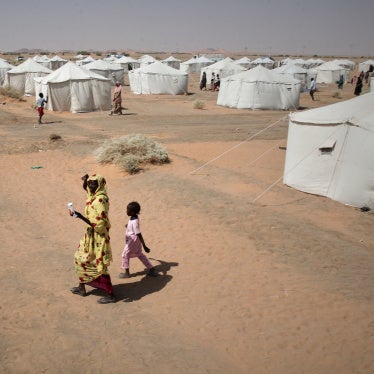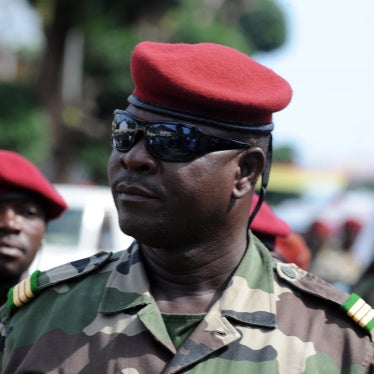Why is Hissène Habré being prosecuted in Belgium?
Habré lives in Senegal, where he was indicted in 2000 on charges of torture and crimes against humanity. Senegalese appeals courts ruled, however, that he could not be tried in Senegal for crimes allegedly committed in Chad. Twenty-one victims, including three Belgian citizens, meanwhile filed charges against Habré in Belgium, under that country’s “universal jurisdiction” law which allowed Belgium to prosecute certain atrocities no matter where they were committed.
Hasn’t the Belgium “universal jurisdiction” law been repealed?
Yes, the Belgium Parliament repealed its universal jurisdiction law, under U.S. pressure, in July-August 2003. Most of the cases filed under that law were then dismissed. A transitory clause permitted the maintenance of cases in which the judicial investigation had already begun and in which there were Belgian plaintiffs, however. The Habré case met these criteria as the investigating judge had already carried out a mission to Chad and three of the original plaintiffs were Belgian citizens.
What are the charges against Habré?
Habré has been charged by Investigating Judge Daniel Fransen with crimes against humanity and other human rights crimes. Habré’s regime was marked by widespread atrocities, including periodic campaigns of violence against ethnic groups whose leaders he perceived as rivals. The exact number of Habré’s victims is not known. A 1992 truth commission accused Habré’s government of 40,000 political murders and systematic torture.
What is the evidence against Habré?
There is both testimonial and documentary evidence. In 2001, Human Rights Watch discovered the files of Habré’s dreaded political police force, the DDS, in its abandoned N’Djamena headquarters. The files detail how Habré placed the DDS under his direct control, organized ethnic cleansing, and kept tight control over DDS operations. In February and March 2002, Judge Fransen visited Chad together with a Belgian state prosecutor and four policemen, where he interviewed victims, witnesses, and even some of Habré’s collaborators. The team visited former detention centers and mass grave sites, and took copies of the documents located by Human Rights Watch. Dozens of victims have also traveled to Belgium to be interviewed.
Why did Habré not flee Senegal?
After the charges against Habré in Senegal were dismissed on jurisdictional grounds, the president of Senegal, Abdoulaye Wade, asked Habré to leave Senegal. Fearing that Habré might flee to a country out of justice’s reach, the victims appealed to the United Nations Committee against Torture (CAT), which called on Senegal to “take all necessary measures to prevent Mr. Hissène Habré from leaving the territory of Senegal except pursuant to an extradition demand.” Following a similar appeal by U.N. Secretary-General Kofi Annan, President Wade agreed to hold Habré in Senegal.
What happens next?
Within a maximum of three weeks, Belgium’s extradition request will go before the Indicting Chamber of the Dakar Appeals Court, where Habré may challenge his extradition. If the court rules that Habré can be extradited, it is then up to President Wade to sign an extradition decree.
Is there an extradition treaty between Senegal and Belgium?
No, but like many countries, Senegal does not require an extradition treaty in order to extradite a suspect, as long as the criteria of the Senegalese extradition law are fulfilled: that the acts alleged must be criminal in both the requesting and the requested state, and that the requesting state has jurisdiction.
Don’t countries refuse to extradite the authors of political crimes?
Like Senegal, most states will not extradite a suspect for a “political offense.” Political offenses, however, generally involve a rebellion against an established government and related crimes. Crimes against humanity, torture, genocide, and war crimes are not considered political offenses. The Genocide Convention expressly provides that genocide shall not be considered a political crime for effects of extradition. The Convention against Torture does so implicitly by requiring that torture be included in the list of extraditable crimes in states parties’ extradition treaties.
Why doesn’t Senegal try Habré itself?
Senegal can and should try Habré itself. Indeed, a Senegalese judge indicted Habré pursuant to the 1984 United Nations Convention against Torture and other Cruel, Inhuman, or Degrading Treatment or Punishment, which Senegal ratified in 1986, and which expressly obliges states to either prosecute or extradite alleged torturers who enter their territory. Higher courts dismissed the charges against Habré, however, ruling that Senegal had not enacted legislation to implement the Convention against Torture and therefore had no jurisdiction to pursue the charges because the crimes were not committed in Senegal. The dismissal drew protests from the United Nations, Senegal’s association of judges, and rights activists around the world. The victims then decided to seek Habré’s extradition to Belgium.
Why isn’t Habré extradited back to Chad?
Chad has never formally sought Habré’s extradition. Even if it did, there are important reasons not to send Habré back to Chad: given Chad’s human rights record, there is a serious risk that Habré would be mistreated or even killed. In addition, Chad’s weak judiciary is not in a position to guarantee Habré a fair trial.
Why can’t Habré be prosecuted by the International Criminal Court?
The International Criminal Court (ICC) is prospective only, addressing crimes committed after its statute went into effect in 2002.
If Habré is extradited to Belgium, what happens then?
Once in Belgium, Habré would be brought to the investigating magistrate who would question him and decide whether to confirm the arrest warrant and place him in detention. Within five days, and every month thereafter, the Chambre du Conseil would review the legality of his arrest and the grounds for his continuing detention. Once the judge completes his inquiry, which he must do within a reasonable time, he sends the case to the prosecutor who gives his recommendation and then to the Appeals Court, which decides if the matter should be scheduled for trial.
If Senegal does not extradite Habré, what will happen?
Habré would remain in Senegal. The U.N. Committee against Torture would likely condemn Senegal for violating the U.N. Convention against Torture. Habré’s victims have said that they would continue to press Senegal to bring Habré to justice in Senegal, seeking legislative changes if necessary.
What is the role of Human Rights Watch?
Human Rights Watch is supporting the Chadian victims, organized into the Chadian Association of Victims of Political Repression and Crime (AVCRP) in their quest for justice, and has helped in designing litigation strategy, collecting evidence, building political support, and finding financing. Reed Brody of Human Rights Watch coordinates the International Committee for the Trial of Habré, which also includes representatives of the International Federation of Human Rights Leagues (FIDH), and Chadian and Senegalese NGOs.








